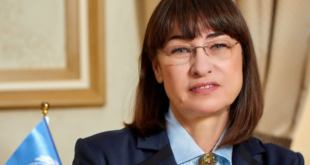What do we really know about the Israeli press.
Samir Sobhi
It is a fact that Israeli journalists know a lot about Egypt’s press. It is also not a secret that we know little about their press. Most ordinary people in Egypt know nothing at all about journalism in Israel, even if Egyptian officials have broader ideas about it.
Naturally, the press today, particularly at the beginning of the 21st century, will be different from what it was only a few years ago. Egypt does not shy away from such changes.
This article is directed to those who are concerned with the future of Egypt’s journalism, especially in the wake of the Media Forum held in Cairo earlier this month that discussed quality journalism, innovation in content, professional media practices and successful business models.
But to go back to the main question: what do we know about the Israeli press or even about the Hebrew language?
The Hebrew language is a Semitic language from the group of Canaanite languages. It belongs to the Afro-Asian language family and is spoken by about seven million people worldwide.
The original Hebrew language became extinct in antiquity, but before it did so it was the language of the Old Testament of the Bible.
Later, the Jews saw a new golden age in the rich literary production they produced during their stay in Arab Spain (Al-Andalus). The atmosphere of tolerance and peaceful co-existence there was the main reason behind their literary growth.
Several prominent literary figures, mainly Torah scholars like Moses Ben Maimon (Maimonides) and Saadiah Ben Youssef Al-Fayoumi made distinguished contributions to literature, such that this age is sometimes referred to as a kind of Hebrew silver age.
In the 18th century, the Hebrew language found a new status, spreading in European countries like Germany, Hungary and the Czech Republic and then Poland and Russia. The Jewish writers of the time, however, did not manage to turn Hebrew into a modern spoken language, and it remained a largely written one. Newspapers written in Hebrew began to appear in the European countries.
Today, modern Hebrew is the first official language of Israel. The establishment of the Hebrew University in Jerusalem in 1927 was among the factors that led to the spread of the modern Hebrew language.
In Egypt today, there are several university departments teaching. Professor of Hebrew studies at Ain Shams University in Cairo Ibrahim Al-Bahrawi interviewed Israeli prisoners of war, for example, and interpreted their testimonies.
He was also a famous journalist, who wrote many books on Hebrew studies. He was an eye-witness to the Egypt-Israel Wars in 1967 and 1973 while he was still a student in Port Said, a city which was harshly affected by both. Many of Al-Bahrawi’s students later taught Hebrew in various state institutions.
The distinguished thinker Abdel-Wahab Al-Messiri portrayed in depth the Jewish character. He prepared the Egyptian Hebrew Encyclopaedia, with which I was honoured to be involved in its first part. The famous author Ihsan Abdel-Quddous also depicted Jewish women in ways that attracted both Egyptian and other readers.
Earlier, there was Yaacoub Sannu, known by his pen name of Abu Naddara or “The bespectacled man”, an Egyptian Jewish journalist and playwright. Sannu’s father worked for Prince Yaken, a grandson of Mohamed Ali Pasha. He travelled to France, and upon his return to Egypt founded the first comic theatre that copied the boulevard theatres in Paris. Soon afterwards, he established the first satirical magazine in Egypt, also called Abu Naddara, in 1877.
The magazine enjoyed great popularity and its circulation was considerable.
I remember the Egyptian researcher Seham Nassar, who studied the journalism of Egypt’s Jews. Nassar is now a leading professor of mass communication, and her PhD thesis was on Jewish journalism. She has written several important books on this issue, including Egyptian Jews: their Newspapers and Magazines, Egyptian Jews between Egyptianism and Zionism, and Writers in the Israeli Press and Zionist Propaganda. These are valuable publications that are of great benefit to students of mass communication.
The Israeli press today is part of the state media apparatus. Press freedom tops its priorities, but the double standard by which the Israeli media deals with acts of violence practised against Palestinian citizens has been widely criticised. What follows is a list of some of most famous Israeli newspapers.
Yedioth Ahronoth, or the “Latest News,” is a daily Israeli newspaper published in Tel Aviv. Founded in 1939, it is the largest newspaper in Israel by sales and circulation, estimated at about 300,000 to 600,000 copies per issue. It is published in both Hebrew and English. Its political affiliation is a mix of both the left and the right.
Haaretz, or “Land,” is a liberal daily newspaper. Its editorial policy is moderate in terms of security, and it has a wide influence inside Israel. Founded in 1919, it is the mouthpiece of the Israeli Labour Party. It has a circulation of 75,000 on weekdays and 95,000 on weekends.
Maariv, or “Evening Prayers,” is a liberal newspaper founded in 1948. It ranks second among Israeli newspapers today, with a daily circulation of about 90,000 copies.
All the newspapers in Israel today are inspired by the sayings of Theodor Herzl, the father of modern Zionism. Himself a journalist, he wrote in a newspaper editorial in 1897 that newspapers should be the “shield which protects the Jewish people.” For years, Herzl’s words remained as guidelines defining the editorial policies of all Israeli newspapers.
David Ben Gurion, the first Israeli prime minister, believed that the Israeli media had an official role to play, and early on he announced the establishment of a board of newspaper chief editors in Israel that would decide on the news that could be published in the country. The board had the authority to prohibit the publication of certain news that it deemed as harming the image of the state. With the technological progress that has been seen since in spreading the news, press censorship in Israel has notably declined.
It is also noticeable that the current decline in the Arab media has been of great benefit to the Israeli press. This may be the reason why some Palestinians prefer to buy Israeli newspapers in order to get a clearer idea about what is planned for them and what lies behind the scenes.
The Israeli media is also a media of war. It shows no mercy towards politicians if they make decisions deemed not in favour of Israeli citizens. The media is free to expose cases of corruption, however, regardless of the post of the one accused. Israeli Prime Minister Benjamin Netanyahu now faces charges of bribery and fraud, for example, and these have been widely reported in the Israeli press.
The Israeli media has lately introduced the role of “media coordinator” whose role lies in making direct contacts with the Palestinians. He lectures Palestinians on security and may also advocate renewing Palestinian licences, abolishing the security ban on Palestinian travel, and allowing them to move freely between Gaza, the West Bank and Tel Aviv without going back into territory controlled by the Palestinian Authority.
The role played by the media coordinator in Israel proves that Israel is well-attuned to the idea of a media war. It should also be admitted that the ones who own the media are also the country’s rulers.
From: Al-Ahram Weekly






